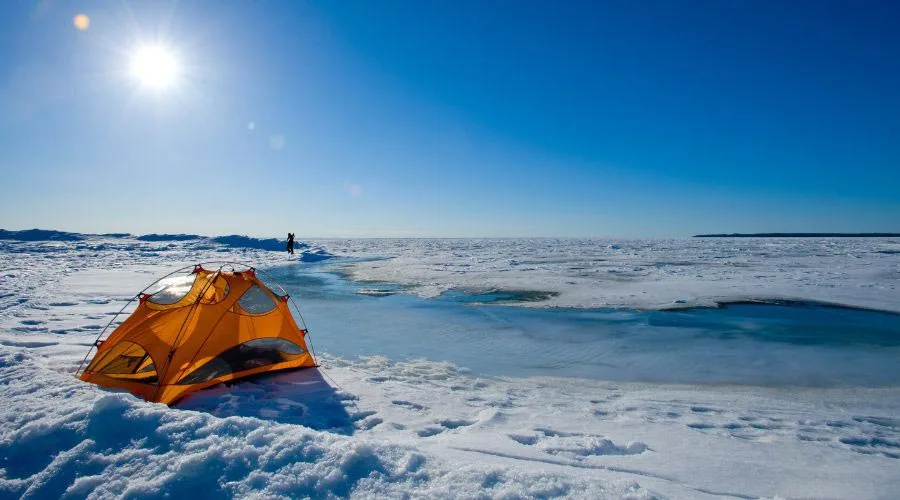If you’ve ever gone camping, you know that there are various tents kinds for various camping activities. There are backpacking tents, family tents, and even luxury tents.
But can you use a regular tent for winter camping? The good news is that as long as it’s a three- or four-season tent that can survive the demands of cold weather, you can use a regular tent for winter camping. Just remember to choose a suitable campsite, use a ground tarp, and pack extra warm clothing. Stay cozy and embrace the magic of winter adventures!
This blog post will talk about how safe it is to use regular camping tents and the type of tent a camper should choose based on the campsite he plans to stay on.
Thus, if you’re curious to learn more, keep reading.
Table of Contents
Regular Tent vs. Backpacking Tent – What’s the Difference?
Traditional tents are usually larger and heavier than backpacking tents, making them less ideal for long hikes than regular camping.
However, they’re typically more affordable and easier to set up. They also have more features, such as extra storage pockets and oversized doors.
On the other hand, backpacking tents are portable and light. Another key difference is that regular tents have thicker, more sturdy walls while backpacking tents are made with thinner fabric.
Nevertheless, backpacking tents are usually more expensive than regular ones. But they’re worth the investment if you plan to spend a lot of time outdoors, unlike a regular camping trip.
Regular Tents on Winter Camping – How Useful Are Those?
Regular tents are the best camping tents for anyone who wants to have a relaxing camping trip.
But now a new issue arises: how practical are these regular tents for winter camping?
Well, these tents have a lot to offer campers. They are quick and easy to set up, which can be a time-saver.
Additionally, they can be a good option for anyone searching for an easy fix at a reasonable cost.
Plus, these tents, especially four-season tents, are thicker and well-insulated, which can easily tackle any weather outcome.
So, what’s the verdict? Traditional tents can be great in terms of providing comfort, affordability, and an easy-setup process.
However, the only downside is that these tents are a bit heavier. So, it would be easier to carry them on a car camping trip than on a backpack camping trip.
The Ideal Tent Setup for Winter Camping – What to Consider?
You’ve finally made the decision to go winter camping! Good luck; you’re in for a treat. However, you must have the proper equipment to enjoy a great time in the winter nature, which starts with your tent.
So here’s a quick guide to picking the perfect tent for your next winter camping trip.
- Think about the number of campers you’ll bring in. If you’re going solo, you’ll need a smaller tent than if you’re bringing along the whole family.
But even if you’re just planning on bringing a few friends, you’ll want to ensure your tent is big enough to fit everyone comfortably.
- Know where you’ll be camping. Get a regular tent if you plan on spending time in the woods. Woods offer much better protection. Thus, you won’t need as much protection from the tents.
However, it’s best to avoid caution and get a tent that can stand up to anything. Therefore, 4-season tents or 3-season tents are ideal for every camping need.
- Another crucial factor is choosing an easy-to-setup tent. After all, you should spend time outside exploring nature, not fiddling with your tent.
- Finally, consider what activities you’ll be doing while camping. If you’re mostly just sleeping in your tent, then a tent that can provide insulation, waterproofing, and comfort should be your top priority.
But if you cook or hang out inside your tent, space will be more important than anything else. So, in such cases, try to choose a larger-sized regular tent to fit your needs.
A Few Basic Styles of Regular Camping Tents
A few basic styles of regular camping tents vary based on their function and capacity. For example,
3-Season Tents
The three-season tent is the most common camping tent, designed for spring, summer, and fall. However, if you place them below the treeline and put on an extra tarp wrapping over it, you may also use them for winter camping.
These tents are typically made from lightweight materials and have mesh panels that provide ventilation and allow you to see out.
Three-season tents come in a range of sizes, from little two-person tents to vast eight-person tents.
4-Season Tents
The four-season tent, made to be used in all four seasons, is another popular camping tent style. So, you may use them not only for winter camping but for other weather camping.
Four-season tents are typically made from heavier-duty materials and have solid walls with fewer or no mesh panels. This makes them warmer in the winter and more protected from the elements.
These tents are also available in various sizes, although they tend to be smaller than three-season tents since they’re designed for use in more extreme conditions.
Specialty Tents
These tents are usually designed for specific activities, such as solo camping or car camping. They come with unique features, such as an integrated rainfly or an asymmetrical design, that make them better suited for specific activities.
Whatever camping tent you select, be sure it is suitable for the surroundings and the number of people you will be sharing it with.
With so many different types of regular camping tents on the market, there’s sure to be one perfect for your needs.
Drawbacks to Using a Regular Tent for Winter Camping
If you love camping, you might be tempted to use a regular tent for all your trips. However, you should be aware of a few disadvantages of utilizing a regular tent before making your purchase.
First of all, regular tents are not designed for extreme weather conditions. So, if you camp in an area that experiences high winds or severe snowfall, your regular tent will likely be damaged or destroyed.
Another drawback is that regular tents can be pretty cramped, especially when camping with a large group of people.
Some regular tents are sometimes uncomfortable as they are made from nylon or polyester. It can make them quite condensed in winter weather. In addition, the floor of a regular tent is usually hard to sleep on.
Finally, regular tents can be heavy and difficult to transport. Thus, if you are planning on doing a lot of hiking or backpacking during your trip, it may be worth investing in a lighter-weight tent like a backpacking tent.
Frequently Asked Questions
Conclusion
So, the answer to the query of “Can you use a regular tent for camping?” is yes, you can use a regular tent for camping. Actually, camping in a regular tent is more manageable and fun.
Although the only concern is that they cannot provide you with the ultimate protection you would need in inclement weather. So, it’s better to take them on short and regular days camping trips.
Also, be sincere about the material and fabric tent you choose. It adds significant value to the comfort of camping. If you plan to camp in the summer, choose a tent material with better ventilation. Otherwise, you will feel boiled hot inside.
This article has shared every tip you should follow for regular tent camping. We hope the information has been helpful enough.



